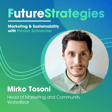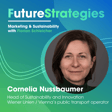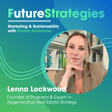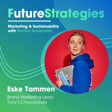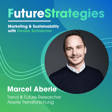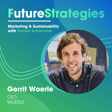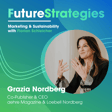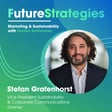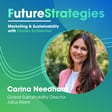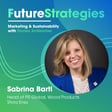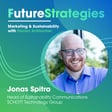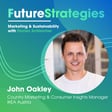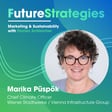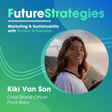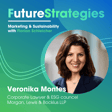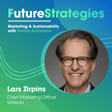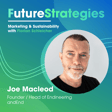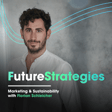Leveraging Policy for Change
00:00:00
Speaker
I would say the biggest lever is in policy. I think business has to be done right and we have not been doing it right. So this is all about fixing what we've done wrong and making it better, moving into the next system, and that transition is going to be regenerative.
Introducing Future Strategies
00:00:17
Speaker
Welcome to Future Strategies. I'm your host, Florian Schleicher.
00:00:22
Speaker
And this show is my gift to you. In honest conversations with inspiring marketing leaders, we explore how marketing and strategies can achieve sustainable growth. If you would like to apply this to your own projects, that's exactly what I do as a strategist, coach, and workshop facilitator. I'm here to help you build the marketing of your futures.
Jillian McFarland's Sustainability Journey
00:00:50
Speaker
So let's jump right into it.
00:00:55
Speaker
Today, I'm talking with Jillian McFarland. Jillian is the co-founder and chief community and brand builder at Forest Bridge. She's an award-winning marketing and nonprofit leader with a background in Markham strategy for higher education and nonprofit with a specialization in sustainability and social innovation.
00:01:14
Speaker
She's a US Air Force veteran with 20 plus years of experience across marketing, business development, fundraising, and community building. Jillian is equal part social entrepreneur, green cities champion, and natural climate solutions advocate.
Mission of Forest Bridge
00:01:31
Speaker
Welcome to the show, Jillian. Thank you. I appreciate you having me. So I'm really excited speaking with you because of your work at Forest Bridge. For those who don't know what you're doing, what is Forest Bridge?
00:01:44
Speaker
Forest Bridge is the brainchild of my founder and I. So her name is Mariana, and she graduated from Harvard with a degree in environmental engineering. So she's been doing this work for a while. And then with my background in marketing, when we met this summer, it just charged us. And really what it is, is taking a for-profit model to bring more green infrastructure into cities.
Green Infrastructure Funding Model
00:02:12
Speaker
We're obsessed with tree plantings, green infrastructure. We have heat index island problems in the US, of course in Dallas area. So we wanted to solve for that. And we wanted to find an alternative funding model. Our solution to that is marketing, using marketing to do that. So you got trillion dollar ad spends basically around there. At least they're predicting coming this year is going to be trillion dollars globally.
00:02:39
Speaker
And you've got corporate brands, big brands, spending a lot of money on marketing, but it's not greening our cities. This is something that would be green advertising, hyper-local, geofencing, low carbon intensive, as well as the ads themselves being CO2 absorbing, things like that, like the billboards and the out-of-home signage. And so we're trying to funnel corporate marketing funds into greening our cities and then pointing to tree plantings
00:03:09
Speaker
that are local. So those groves can be 100, 200 trees. So you can scan a QR code, learn all about that project as well. So instead of doing carbon offsetting in South America and such, we're in our cities. The carbon offsetting is needed here as well. We're needing to green our cities. So that's really what we're trying to do.
Ensuring Project Sustainability
00:03:27
Speaker
That's so fascinating because there's a lot of companies right now, as you said, who are offsetting their carbon by planting trees somewhere and then nobody keeps track of it. Nobody knows what happens to them. There is no relationship also between the trees that are planted and the company or the customers. You really bring those trees to where people are living. Definitely. We are heavy-handed in the maintenance of those trees.
00:03:56
Speaker
The founder has seen many times a well-intentioned tree planting project, and it gets left, and there's no drip irrigation or anything like that. And so we check up on the trees. We make sure they stay alive, and we want 100% growth and survival rate on these projects.
Creative CSR and Marketing Strategies
00:04:16
Speaker
So you're going to lose some sometimes, the shock of the root system and whatnot, but we want to make sure these are going to be around for a long time to come.
00:04:25
Speaker
How does it work? I have a company. I want to run an advertising campaign out of home. What happens next? You would get with us. You would tell me what your goals are with your marketing program. This is a combination of CSR work and marketing. There might be a PR play involved in this where we tell the public what's going on and the efforts being done on behalf of the company to make them more sustainable in their supply chain and things of that nature.
00:04:55
Speaker
If you did something where you wanted to have community activation and you had a new product launch or something, you do pop-ups, you can do tree music even with a CO2 absorbing mural. So we paint it with CO2 absorbing paint and have a muralist come in, or we have like a paint by number where volunteers from the corporation or the company can come in and paint this mural with a CO2 absorbing paint. And then the tree music is more engaging. So if you're walking through a city, like on a city block,
00:05:24
Speaker
you see this and it's reclaimed wood benches, you see a QR code, you sit down and it's like, listen to me.
Importance of Transparency in Marketing
00:05:31
Speaker
And we have maybe temporary potted plants and trees. If we can get permanent ones in there, we will. And then there's something connected to the tree that where you can actually listen in on your phone. So you could have a moment in nature, even in the middle of the city, and that engages you and helps you remember the brand. But it can also, you know, if you want to
00:05:54
Speaker
Scan the QR code and learn more about the product launch. Maybe it's a carbon, you know, less carbon intensive supply chain that they're working on. Or for something like Apple would be ideal, for example, where they're trying to, they're already carbon neutral in some cases, but now they're making their products carbon neutral as well.
00:06:14
Speaker
trying to influence policy even by buying into more renewable markets, things of that nature. So it's really to highlight your sustainability work to the public with some sales, but we don't want marketing to just sell us anymore. It has to do more. And so help me understand it a little bit further. So your target audience is then companies, but you also need to work with the cities because they will provide you with the space.
00:06:39
Speaker
That's right. So there is some permits involved in this working with developers. So property managers that have, for example, we have in Dallas, we have an area called deep alum. So that district, we talked to the product property management around there were like, Hey, you know, what areas could we do this work in? This is, this is new. This is new work really, you know, pop up forest, for example, with the CO2 absorbing murals or Moss painting, you know, where could we do this?
00:07:09
Speaker
And where could it be beneficial to you all as well? Sometimes when company goes in and leases an area, they're required, if they make any changes, they're required to replace trees, if they move them or anything like that. So there's things like that that are attracted to the property management, but we want to take it a step further, of course. So the municipality is, in certain districts, are our customers as well. You're right.
00:07:35
Speaker
And we talked about this, we see more and more customers and consumers distrusting corporate climate goals. We see a lot of greenwashing out there. How do you make sure that it's not okay? Let's bring some trees there and when the campaign is done, the trees get cut down or how do you ensure that it has a lasting sustainable impact? Right. So for good reason, people aren't trusting corporations. There's certain ones that.
00:08:04
Speaker
Like you said, greenwashing, we're not, you have to respect the intelligence of the customer. We know we're looking at this, you know, especially Gen Z millennials, like we're researching these things and we'll find out if it's not accurate. So first you make sure that your marketing is, is completely open, transparent and ethical. And that's telling them, Hey, we've got this issue, but we're working on it with this. And again, right measurements for ESG.
Outreach and Marketing Techniques
00:08:32
Speaker
you're solving the problems has to be discussed. We would have an agreement with the company, for example. It's not just, hey, to work with us, they're stipulations, right? We would have stipulations where it's like, here's what you can't do in the next, like even like a contract term, maybe a year or two years to make sure those trees stay in the ground. There's not gonna be development there. I had an organization called the Great Seed Bomb where we would do campaigns
00:08:59
Speaker
where we distribute native wildflower and milkweed seed along a bike route on our bikes and we'd throw, you know, seed bombs along that route. And we had an agreement that they would do a no mo zone in those places. So the cities or the water district that was in charge of that would
00:09:16
Speaker
say, OK, we're not going to mow there anymore. This will be not developed upon. We already know. So we're going to choose land that will not have any development plans and for the foreseeable future as long as possible. When we get more power behind us and more backing, I'd like to make it permanent, where it's like you cannot develop on this land. This is now conservation land. But right now, we're trying to just plant on conservation land already to make sure those projects live forever.
00:09:43
Speaker
Yeah. And you're a marketing strategist yourself. So I would be curious also in how do you approach the issue of your own business marketing strategy? How did you start and what kinds of tools do you use now to attract clients yourself? Right. Right now,
Complexity of Sustainable Business Models
00:10:01
Speaker
I'm doing massive outreach in terms of marketing visibility. So something like this, like getting on podcasts, being a guest on podcasts.
00:10:10
Speaker
Our content strategy is in play now where we're writing articles and distributing those, reaching out to people that get it so they can help us share that as well. And then we did a LinkedIn ad campaign for engagement only. Since we're early in work, we're a startup. So engagement only, and it was have people look at our, our pitch deck, um, and, and get comments on that and have our network share that. Cause this is, this is a new somewhat novel concept. So.
00:10:40
Speaker
You can't just advertise it with something with seven words on it, have people get it.
00:10:46
Speaker
I think that's also a tricky part, isn't it? Because with so many ideas out there, the old business ideas, they are super simple. And now with sustainability, there comes another layer because mostly people don't buy things because they're sustainable, but they buy it because it serves a problem, it serves a need. And then on top of it, it is sustainable. Right. Exactly. That's true. I think there's a harmony to that where you can have
00:11:16
Speaker
something that's practical, but it's also sustainable.
Bridging Funding Gaps for Urban Projects
00:11:19
Speaker
I think that this is already a proven business model, if you think about it, Florian, because it's a marketing agency that uses ad tech that's already has been used for a decade or more.
00:11:34
Speaker
And then it's combining that with a green landscaping company, essentially. So it's just a combination of these two things done well and done right with the lens of we want to highlight sustainability projects for big brands. So I think that that's where the winning strategy lies, is taking these for-profit business models, flipping them on their head, making them work and funneling funds into greening our cities.
00:12:03
Speaker
making the company more sustainable, influencing the market eventually. You know, you got Apple doing big things right now. People are watching. I mean, you're going to have competition and you don't want to go the way of Netflix and Blockbuster if you don't keep up. And this is going to be a keep up thing just with the way generation like the different generations are right now and what we're paying attention to.
00:12:27
Speaker
Yeah, definitely. And I think companies might have a couple of years left and then regulations will cut in, customers will demand sustainability and the companies who now claim their spot that they want to do something sustainable, they will then be already there where everybody still has to go. So they will have a competitive advantage.
00:12:47
Speaker
If they start working on sustainability now. And what is so interesting about this idea that you have is there are lots of campaigns right now where they're advertising how sustainable they are, but you have a solution to advertise sustainable. Yes, that's right. So it's not just about, Hey, we're going to plant some trees. And, you know, there's, there's a lot of aspects to that. There's an engagement.
00:13:14
Speaker
for customers, there's employee engagement with the volunteer groups coming out. In some cases, my founder
Business Responsibility in Sustainable Change
00:13:21
Speaker
is planting these on Dallas independent school district property. So students and the education aspect is there too, really around combining the best we have right now to keep carbon intensity low. So advertising has like a one to 3%. The emissions are
00:13:44
Speaker
I think you read this on the page as well, but I don't think a lot of people know when they click on an ad that that adds to carbon emissions or the buying process behind digital advertising and the process where we bid and we purchase ad space or, you know, Google AdWords and the key, all of that can add to carbon
00:14:05
Speaker
I was super shocked when I read this that digital advertising generates about 3.5% of global greenhouse gases each year. 3.5% for just digital ads. That's insane. Right. If you're holistically looking at your company, if you're not addressing that now, then you have a problem. That's supply chain issue. That's scope three emissions.
00:14:31
Speaker
So now you have to green your advertising. Now you have to green your marketing. And why not? Our signage can do things. We've got billboards out there. You know, you got the plastic vinyl and it's static. You know, at least we've got digital now where we can do LEDs and that helps a bit.
00:14:48
Speaker
and the rotation of things. But you also, you know, we've got billboards out there that do, there's water. Have you ever heard of, there's ones in, I think in Brazil, Coca-Cola even did one where it was a green billboard where there was moss and it absorbed moisture from the air when there was fog and you could get water at the bottom of the billboard itself, like the pole that holds it up.
00:15:12
Speaker
These are the things that are interesting to us we haven't gotten there yet but that's really the overarching goal is to get to where all of our out of home is sustainable as possible and innovative all of the digital marketing is sustainable and innovative how can make everything green.
00:15:27
Speaker
Now, one more strategic question because I just wrote a newsletter on the number one reason why startups fail and
Business as a Trojan Horse for Policy Change
00:15:36
Speaker
new companies fail. And it's not actually solving a customer problem, not having figured out what their market fit is. So I'd be curious in how did you come up with what's the most urgent problem that you want to solve for your customers, which is businesses.
00:15:54
Speaker
Yes, I would say watching mega trends, watching trends like figuring out advertising is not green. If you want a holistic supply chain, like a supply chain that's circular and green, you're going to need to look at your advertising now, as I said, but also figuring out that the cities that we're living in, you know, they're five to 10 degrees hotter now. And how do we how do we offset that? Why aren't we building, you know, more green walls or green roofs or
00:16:24
Speaker
floating bio islands that create more habitat within our urban rivers. Why isn't this being done? And when I've talked to architecture firms in the past, it seems like the clients just do not have the extra money. These things are expensive now. They have down economies of scale. How do we bridge that? So forest bridges there to bridge that market issue, the saturation issue, the funding issue. This is an alternative way to get money in the door.
00:16:51
Speaker
And then you hybrid, like our organization ultimately will be hybrid to where we can accept grants because we're working in that world as well in almost a nonprofit mission, but then being the for-profit to get there faster and scale faster. So I would say looking for your clients, identifying problems, and in this case it's several, and then finding a solution that combines all of the things that would actually hit these issues.
00:17:20
Speaker
and solve for some of them and at least try to like start the idea. These things develop. I mean, Amazon started with, oh, let's sell some books online. These continue to evolve until they're huge. So why can't an idea like this start this way and actually solve bigger and bigger problems that we haven't thought of yet?
00:17:43
Speaker
following those breadcrumbs really on Megatrends. Reminds me of a quote I read, I think it was yesterday, by the founder of the House of Beautiful Business and he wrote, business has power and responsibility to heal, to heal us as individuals, to heal our connection with nature and to heal the scars and the wounds that we have suffered because of our current system. And so I deeply believe that business
00:18:10
Speaker
plays a very important role in the transformation that we need to take. And I'd be curious on your take on, because some people say it's politics that should provide the solution. Some say it's business and others say it's consumers. What do you think that the biggest lever is at the moment? I would say the biggest lever is in policy. I think business has to be done right and we have not been doing it right. So this is all about fixing what we've done wrong and making it better.
Challenges in Urban Sustainability Projects
00:18:40
Speaker
moving into the next system and that transition is going to be regenerative. I think the market, it's a combination of things, right? The consumers are demanding certain things, the companies are having to react to that. That all influences policy and politics behind that.
00:18:58
Speaker
different things that are legislation that comes through. I mean, this is a way to push that. And it's a way to push it almost as a Trojan horse. Florian is what I call this. It's getting into the system and changing it from within. Like how do we do this the right way? Not all business is bad. We need some of these services. All these products are helping people. There's medical benefits to some of these things being developed. But how do we do that the right way? And being in it and being a change maker inside of it is key.
00:19:28
Speaker
I think even employees can do this, but especially startups should be doing it. Leading the way, big corporations need to be influenced.
00:19:36
Speaker
that then influences, especially in the US, that then influences policy. Yeah. And I think that's the role of business to provide best practice examples of how it can be done so that then governments see, okay, business is sort of ready. They have some ideas because they don't want to impose something when the economy hasn't yet figured out how to address this. And I think that's also the reason why we see governments
00:20:02
Speaker
lagging behind being slower than we actually want them as sustainably thinking people is because they don't see that change coming from business. So they are afraid if they impose something, then it will cripple the economy.
00:20:15
Speaker
Yes, and they don't want to do that. I mean, these are these are public servants. They always have this in the back of their mind, you know, how to best handle these issues. But it has to be, you know, when I worked on university campuses, this is interesting, our, our engineering and business units, so those schools of business,
00:20:35
Speaker
would push little things like even the way we advertised and recruited into brand advertising we push little things right systems even and the university would kinda stay back almost like a government would and watch how it played out and if it worked and there weren't there wasn't a lot of risk they would adopt that for the university i think that's what i'm talking about here is businesses having to show the government this does work here it is
00:21:01
Speaker
We're making it profitable in a sustainable way. And so then the government maybe won't be as shy to enact these policies. But I feel like these things are coming. The regenerative economy is coming. It's making sense. Things are falling into place. They're just watching right now, but we do need to enact regulation to make it
00:21:23
Speaker
like really saturate the market. That's where the market saturation gets faster. Yeah, totally agree.
Innovative Sustainable Marketing Strategies
00:21:30
Speaker
Coming back to business once more, what do you hear from your clients at the moment on how willing they are?
00:21:38
Speaker
to start a new project with you also, and what do you think are some things that are still challenging for them in terms of, okay, let's rethink this, let's not have a regular billboard, but let's go with some kind of plant tree initiative? Well, we're talking to bigger brands for this reason.
00:21:59
Speaker
can be scary to take on something so new. Some people we get on the phone when we do business development calls are like, what? We've never heard of this? How does this work? And it's really the first people that take on things like this win because it's novel. It cuts through the clutter and the noise. The PR is just there. I mean, the second a news outlet gets a hold of a story like this, that brand is going to get more attention. So it is challenging.
00:22:29
Speaker
in that it's new and you're encouraging people not to be change makers. Like you're telling a business who's typically conservative and only concerned with the bottom line, you have to find the ones that are already thinking about this really. And you're the road to get there. So focusing on the innovators as your target audience at the moment and not so much the majority, the early majority, late majority and so on.
Future of Marketing: Transparency and Education
00:22:53
Speaker
Not yet. I mean, but my true dream is if
00:22:57
Speaker
this were to take on a transition to the SMEs, small and medium sized enterprises. We've got a transition underway even with the silver tsunami and the money in those businesses trading hands down to generations below it. It's an opportunity. We can flip all of this.
00:23:14
Speaker
And we can be innovative and we can be sustainable in greener cities and have products that are less carbon intensive. This is all possible. So it's just a matter of finding the people that will take it on first.
00:23:27
Speaker
That sounds so exciting and I really can't wait to see this in action and to see a more sustainable city everywhere. But Jillian, before we close this, I would like to move on to my three final questions. So first, what do you think is great marketing in three words? It is transparent, it is educational, and it respects the, this isn't three words, but it respects the intelligence of your customers.
00:23:57
Speaker
So really come at it with some sophistication. I think that's good marketing. It's more than just the amount of clicks or impression numbers. Some of these things are a mission and you're trying to influence, like it's thought, thought, thought leadership in some ways. So how do we use marketing to transform the economy? That's pretty powerful to think about, but we're communicators, right? Our rhetoric matters. Our rhetoric and our
00:24:26
Speaker
Burbage we use even can change people's behavior. That's powerful. So it has to be responsible. It has to be ethical.
00:24:34
Speaker
It has to have respect for the communities. I liked what you said with to use marketing to transform the economy because I think marketing does such a great job when it comes to changing behaviors, even manipulating people into doing something they haven't really thought of yet. I think the opportunity we have here at hand now is to use that for something good. Yes.
00:24:59
Speaker
I sold hamburgers at McDonald's in marketing, but I can also use it to help good business ideas, green ideas to thrive. That's right.
Recommended Reading: Green Swans
00:25:09
Speaker
So persuasion, right? So if you've got the platform, which marketing does, why not use it for good? Yeah. Next question. What's the future of marketing? I think it's hyper-local. I want it to be, as I said before, transparent and ethical. I think the future of marketing,
00:25:28
Speaker
is educational. I think it'll help people more than just selling things. I think it's a win-win situation and a relationship between a brand and people. How do we make things better together? It can become collaborative, I think. I'll give a reason for that. One example, one idea that my founder and I have had is these pop-ups can have a digital screen that links with American Forests, for example, or links
00:25:58
Speaker
the Arbor Day Foundation and the customer can make a donation and then the corporation matches that donation right on that pop-up. So it's like, what can you do? What's tangible that would make me feel like I am making a difference and then do it? And partnerships are vital in that way. Love it. Last question. Sure. What book have you recently read that you would like to recommend here? Oh gosh.
00:26:23
Speaker
I read a regenerative business book recently, but I always recommend right now, Green Swans by John Elkington. It's the coming boom in regenerative capitalism. I recommend that one. I haven't heard of that. I'll check it out. Green Swans is an event really.
Closing Remarks on Business and Sustainability
00:26:40
Speaker
It sounds like it's identifying startups that are doing this work, but really what you want to do is grab onto the opportunity we have right now, and we can be regenerative startups.
00:26:52
Speaker
We can be regenerative companies, we can influence those. I mean, sometimes these companies, they're attracted to Silicon Valley because it's like, what's cool? What's kind of new and happening? It's like, why not be like, well, being green is. And it's beyond being cool, it's our survival. And it's the right way to do things more so. So yeah. Being cool requires that there is still a planet where we can be cool.
00:27:19
Speaker
Exactly. Right. So all of this makes sense. It's sense making, right? It's making the connections to how to best do this and how to better do this. So I'm obsessed with making business better. That's a great last line. Thank you. Thank you so much for coming on the show today. And thanks for reaching out to me.
00:27:39
Speaker
Absolutely. Thank you for the work you're doing, what you've written. I mean, I've really been inspired, encouraged me because I felt less alone reading what you wrote. So thank you. All right. So thanks again. And I look forward to our next chat. Thank you. You as well.
00:27:56
Speaker
That's it for today. Thank you so much for listening. If you have enjoyed this episode, please give me a rating and a review. This means the world to me, as I really pour my heart into the production and the interviews with those brilliant minds. If you are looking for an easy way to learn strategic marketing, check out the Simple and Sustainable Marketing Academy, where I share the basics of strategic and sustainable marketing in an online life setting.
00:28:26
Speaker
You can also sign up to my inspiring newsletter, where I deliver valuable thoughts to your inbox on how to achieve sustainable growth. I promise you will like it. And if you want to get in touch and find out more about me and my projects, just have a look at the links in the show notes or find me on Instagram and LinkedIn at Florian Schleicher. Thank you so much for listening and I look forward to sharing more with you in the next episode.

